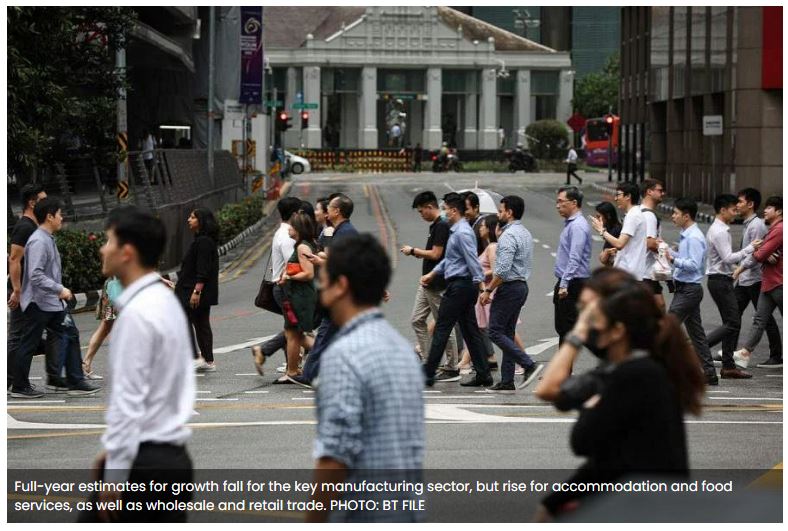Economists barely change 2023 forecasts for Singapore’s growth, inflation: survey
PRIVATE-SECTOR economists barely changed their overall 2023 estimates for Singapore in a quarterly survey on Wednesday (Mar 8), with a full-year growth forecast of 1.9 per cent, up marginally from 1.8 per cent in the previous survey.
Their core inflation forecast edged up to 4.1 per cent from 4 per cent before, while their headline inflation forecast slipped to 5 per cent, from 5.2 per cent before.
The survey, published by the Monetary Authority of Singapore (MAS), was sent to 26 professional forecasters on Feb 13. It garnered 21 responses, reflecting their views and not MAS’.
The updated expectations remain within official forecast ranges for growth – between 0.5 and 2.5 per cent – and core inflation, between 3.5 and 4.5 per cent.
The new headline inflation projection remains below MAS’ estimate of 5.5 to 6.5 per cent.
Behind the similar forecasts for overall gross domestic product (GDP) growth were some specific differences in outlook. Non-oil domestic exports are now expected to contract more sharply, by 4 per cent instead of the 0.5 per cent fall in the previous survey.
Growth for the key manufacturing sector is expected to be flat, compared with an earlier forecast of 0.3 per cent. Estimates also fell for construction, and the finance and insurance sector.
But they rose for accommodation and food services – to 8.4 per cent, up from 5.6 per cent before – as well as wholesale and retail trade.
In Q1 2023, GDP growth is expected to be 1.3 per cent, down from the preceding quarter’s 2.1 per cent growth and lower than the full-year projection. Inflation for the quarter is predicted to remain elevated at 6.5 per cent for headline inflation, and 5.5 per cent for core inflation.
However, most survey respondents do not expect MAS to tighten policy further at its meetings this year, after it recentred the Singapore dollar nominal effective exchange rate (S$NEER) policy band upwards at its last meeting in October 2022.
For the upcoming April meeting, less than a quarter (23.8 per cent) expect the S$NEER slope to be steepened, down from a third in the last survey. The same proportion expect the level at which the policy band is centred to be raised, up from one in nine before.
For October, most economists surveyed expect unchanged monetary policy. Only one respondent predicts a flattening of the S$NEER’s slope.
The most-cited downside risks to Singapore’s growth outlook were worsening geopolitical tensions and inflationary pressures, each named by 56.3 per cent of respondents, more than in the previous poll. Worsening geopolitical tensions were indicated as the top risk by 18.8 per cent, and inflationary pressures by 12.5 per cent.
A global growth slowdown was ranked the top risk by the most respondents, at 31.3 per cent. Half of the respondents named it as a potential risk.
For factors that could result in higher-than-expected growth, more robust growth in China – due to macroeconomic policy easing and economic reopening – remained the most-cited factor. It was named by 87.5 per cent, and ranked the top upside risk by 56.3 per cent.
Other upside risks were better-than-expected external economic growth and a faster recovery in the tech cycle.
For 2024, economists forecast GDP growth to pick up to 2.5 per cent. Headline inflation is expected to ease to 3.1 per cent, and core inflation to 2.9 per cent.
Source: https://www.businesstimes.com.sg/singapore/economists-barely-change-2023-forecasts-singapores-growth-inflation-survey


 English
English




